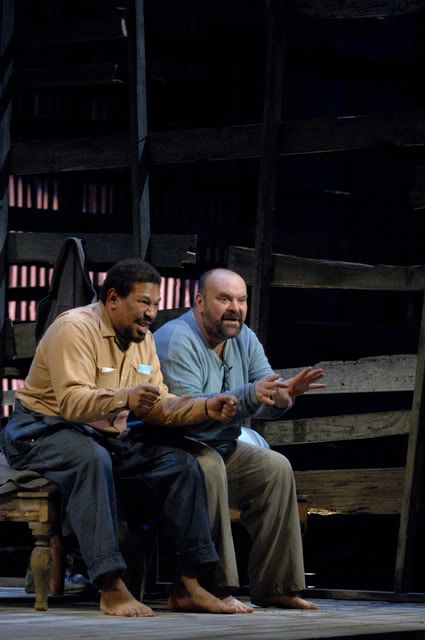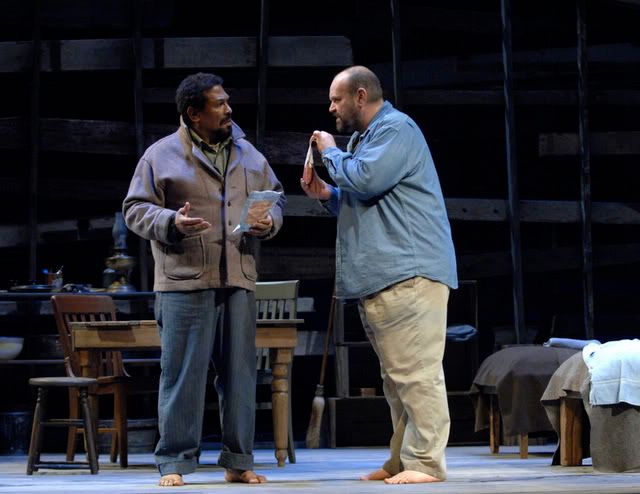Review: `Blood Knot’
Opened Feb. 13, 2008 at American Conservatory Theater Powerful performances tighten ACT’s KnotThree stars (Powerful, scary)Athol Fugard’s Blood Knot comes from a terrifying place, and I don’t mean the apartheid-dominated world of South African in the early 1960s, when the play was written.The horror of Blood Knot is deeply human. It comes from that potential each of us has to be a monster, to let our better selves be trapped by fear, hatred, violence and lust for power.At the center of the play, now receiving a sturdy production from American Conservatory Theater directed by Charles Randolph-Wright, indeed its only inhabitants, are brothers Morris and Zachariah living in a Port Elizabeth shack.Zach (Steven Anthony Jones) is dark skinned and spends his days at an arduous, demeaning job that takes a heavy mental and physical toll on him. Morrie (Jack Willis) is much lighter skinned – you might even say he’s white – and though he was gone for many years, he has been living with his brother for about a year, cooking, cleaning and preparing Epsom salt foot baths at the end of along work day.Act 1, for me, is troublesome. Fugard gives us a glimpse into the domesticity of the two men and hints at the drama to come. But aside from the writing of a pen-pal letter to an 18-year-old woman who turns out to be white and the sister of a cop, there’s more foreboding than drama.Finally, in Act 2, we get to the dark heart of this family drama. Zach takes the money they’ve been saving to buy a two-man farm and squanders it on buying a fancy suit – complete with hat and umbrella – for Morrie to wear so he can meet the pen-pal girl in Zach’s place (a black man writing to a white woman would be unthinkable) because he can pass for white.By forcing Morrie to play the game of “white man,” suit and all, Zach opens up a troubling episode that lays bare the brothers’ tangled race issues and leads to violence and, to put it mildly, fraternal upset.
Powerful performances tighten ACT’s KnotThree stars (Powerful, scary)Athol Fugard’s Blood Knot comes from a terrifying place, and I don’t mean the apartheid-dominated world of South African in the early 1960s, when the play was written.The horror of Blood Knot is deeply human. It comes from that potential each of us has to be a monster, to let our better selves be trapped by fear, hatred, violence and lust for power.At the center of the play, now receiving a sturdy production from American Conservatory Theater directed by Charles Randolph-Wright, indeed its only inhabitants, are brothers Morris and Zachariah living in a Port Elizabeth shack.Zach (Steven Anthony Jones) is dark skinned and spends his days at an arduous, demeaning job that takes a heavy mental and physical toll on him. Morrie (Jack Willis) is much lighter skinned – you might even say he’s white – and though he was gone for many years, he has been living with his brother for about a year, cooking, cleaning and preparing Epsom salt foot baths at the end of along work day.Act 1, for me, is troublesome. Fugard gives us a glimpse into the domesticity of the two men and hints at the drama to come. But aside from the writing of a pen-pal letter to an 18-year-old woman who turns out to be white and the sister of a cop, there’s more foreboding than drama.Finally, in Act 2, we get to the dark heart of this family drama. Zach takes the money they’ve been saving to buy a two-man farm and squanders it on buying a fancy suit – complete with hat and umbrella – for Morrie to wear so he can meet the pen-pal girl in Zach’s place (a black man writing to a white woman would be unthinkable) because he can pass for white.By forcing Morrie to play the game of “white man,” suit and all, Zach opens up a troubling episode that lays bare the brothers’ tangled race issues and leads to violence and, to put it mildly, fraternal upset. The fact that the men are brothers means they can get to troubling places in one another faster than just about anybody else. They can hurt each other -- and, conversely, help heal each other – with alarming efficiency.Jones and Willis bump through the first act making us believe they are brothers but don’t fully pull us into their world. But in Act 2, their connection to each other and to the ferocious emotions is seismic.Set designer Alexander V. Nichols fills the ACT stage with sheets of corrugated metal (which capture Kathy A. Perkins’ lights beautifully, especially when the men are fondly remembering a game they used to play in an old car), though most of the action is confined to the center of the stage where he creates an impressionistic shack of wooden slats.The bleak world of the South Africa the brothers inhabit is effectively evoked in the design, but the most evocative aspect of the production is the music by Tracy Chapman. Mostly underscore, some instrumental, some with vocals, the music is filmic and powerful. At the top of Act 2, Chapman sings (on tape) a beautiful song about the heart of every man while we see video images of South Africa. It’s a glorious moment.But the play, of course, belongs to Jones and Willis, who, for 2 ½ hours, pull us into quiet lives buffeted by storms both political and deeply personal. Their intensity, especially in the final section of the play, is astonishing, and the deeper they go, the more universal the play becomes.Blood Knot continues through March 9 at the American Conservatory Theater, 415 Geary St., San Francisco. Tickets are $17 to $82. Call 415-749-2228 or www.act-sf.org.
The fact that the men are brothers means they can get to troubling places in one another faster than just about anybody else. They can hurt each other -- and, conversely, help heal each other – with alarming efficiency.Jones and Willis bump through the first act making us believe they are brothers but don’t fully pull us into their world. But in Act 2, their connection to each other and to the ferocious emotions is seismic.Set designer Alexander V. Nichols fills the ACT stage with sheets of corrugated metal (which capture Kathy A. Perkins’ lights beautifully, especially when the men are fondly remembering a game they used to play in an old car), though most of the action is confined to the center of the stage where he creates an impressionistic shack of wooden slats.The bleak world of the South Africa the brothers inhabit is effectively evoked in the design, but the most evocative aspect of the production is the music by Tracy Chapman. Mostly underscore, some instrumental, some with vocals, the music is filmic and powerful. At the top of Act 2, Chapman sings (on tape) a beautiful song about the heart of every man while we see video images of South Africa. It’s a glorious moment.But the play, of course, belongs to Jones and Willis, who, for 2 ½ hours, pull us into quiet lives buffeted by storms both political and deeply personal. Their intensity, especially in the final section of the play, is astonishing, and the deeper they go, the more universal the play becomes.Blood Knot continues through March 9 at the American Conservatory Theater, 415 Geary St., San Francisco. Tickets are $17 to $82. Call 415-749-2228 or www.act-sf.org.